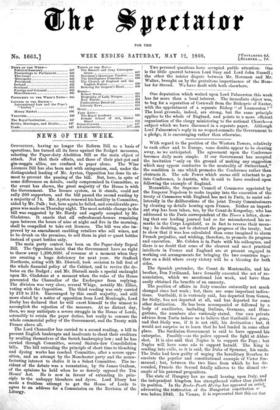NEWS OF THE WEEK.
OPPOSITION, having no longer the Reform Bill as a basis of operations, has turned all its force against the Budget measures, selecting the Paper-duty Abolition Bill as the main object of attack. Not that their efforts, and those of their pint-pot and gin-noggin allies' are confined to paper alone. The Wine Licences Bill has also been met with antagonism' and, under the distinguished leading of Mr. Ayrton, Opposition has done its ut- most to prevent the passing of. the bill. But, here, in spite of some differences on details, easily compromised in Committee, as the event has shown, the great majority of the House is with the Government. The licence system, as it stands, could not rally 200 supporters, and the bill passed the second reading by a majority of 74. Mr. Ayrton renewed his hostility in Committee, aided by Mr. Pail; but, here again he failed, and considerable pro- gress was made on Thursday night. The most notable change in the bill was suggested by Mr. Hardy and eagerly accepted by Mr. Gladstone. It enacts that all refreshment-houses remaining open between the hours of nine at night and five in the morning, shall be compelled to take out licences. The bill was also im- proved by an amendment enabling retailers who sell wines not to be drunk on the premises, to sell them in pint or quart bottles instead of quart bottles only.
The main party contest has been on the Paper-duty Repeal Bill. The Opposition insist that the Government have no right to throw away 1,200,000/. of revenue at a moment when they are creating a huge deficiency for next year. Sir Stafford Northcote, acting with Mr. Disraeli, took occasion to fall foul of the whole financial policy of the Cabinet, and to revive the de- bates on the Budget ; and Mr. Disraeli made a special onslaught upon Mr. Gladstone at a moment when the rules of the House prevented the Chancellor of the Exchequer from replying. The division was very close, several Whigs, notably Mr. Ellice, voting with the Opposition. The third reading was only carried by 219 to 210. Encouraged by this small majority, and still more elated by 'a notice of opposition from Lord llonteagle, Lord Derby has declared that he will exert himself to the utmost to accomplish the rejection of the measure. At no distant day, then, we may anticipate a severe struggle in the House of Lords, ostensibly to retain the paper duties, but really to censure the whole commercial policy of the Government, and the Treaty with France above all.
The Lord Chancellor has carried to a second reading, a bill to prevent English bankrupts and insolvents to cheat their creditors by availing themselves of the Scotch bankruptcy law ; and he has carried through Committee, several Statute-law Consolidation bills. The bill extending the principle of short time to bleaching and dyeing works has reached Committee, after a severe oppo- sition, and an attempt by the Manchester party and the manu- facturing interest to shelve it in a Select Committee. The in- cident of the debate was a recantation, by Sir James Graham, of the opinions he held when he so fiercely opposed the Ten Hours' Act. He is now in favour of extending its prin- ciple to the unhappy bleachers and dyers. Lord Ebury has made a fruitless attempt to get the House of Lords to agree to an address for a Commission on the Revision of the Liturgy. Two personal questions have occupied, public attention. One is the little quarrel between Lord Grey and Lord John Russell ; the other the noisier dispute between Mr. Horsman and Mr. Walter, brought on by the gratuitous impertinence of the Mem- ber for Stroud. We have dealt with both elsewhere.


























